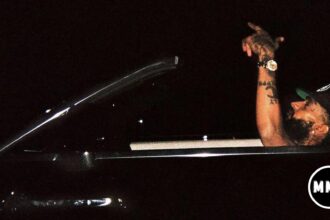No one in basketball history has more charisma, style, beauty, and game than Magic Johnson. The same is true for Stevie Wonder and music history. This week on TSL, Steven unites two artists who define smooth, who defy ordinary, two artists who will astound with Magic and leave you in Wonder.
Hello and welcome to Week 5! After mashing Celtic legend Larry Bird with timeless rock group Queen last week, it’s only fitting that we take on the leader of the Showtime Lakers—and Larry’s arch-rival—for today’s edition.
Earvin “Magic” Johnson grew up in Lansing, Michigan with his 9 siblings and a natural love for the game of basketball. He idolized Bill Russell and was especially fond of his championship rings. Before the “Magic,” Earvin was teased by the neighborhood kids and dubbed “Garbage Man” because he would help his father with janitorial work around town.
During his 8th grade year, after scoring 48 points in a game and establishing himself as a dominant junior high force, Johnson began to focus on his long-term basketball opportunities. Though he wanted to play for the storied Sexton program, he ended up at the predominantly white Everett High School, later saying, “As I look back on it today, I see the whole picture very differently. It’s true that I hated missing out on Sexton. And the first few months, I was miserable at Everett. But being bused to Everett turned out to be one of the best things that ever happened to me. It got me out of my own little world and taught me how to understand white people, how to communicate and deal with them.”
Following a colossal triple-double performance with 36 points, 18 rebounds, and 16 assists as a high school sophomore, sportswriter Fred Stabley Jr. was the first to dub the rising star “Magic.” Interestingly enough, Johnson’s mother, a devout Christian, wasn’t a fan of the nickname believing it to be sacrilegious. Regardless, the magic was just beginning as Earvin capped off a 27-1 senior season with an overtime win in the title game to become Michigan State Champions, an accomplishment he dedicated to his best friend, Reggie Chastine, who had died in a car accident the previous summer. Johnson credited Chastine with his development as a human and a player, saying he struggled with self-doubt at the time. Magic finished his high school career as the best player in Michigan basketball history.
After two years at Michigan State University and coming off of a championship victory over Larry Bird’s Sycamores—in what was the most-watched college basketball game ever—Magic entered the 1979 NBA Draft and was selected first overall by the Los Angeles Lakers. In his debut season, the 6’9” rookie transformed the concept of the NBA point guard and was named an All-Star Game starter—averaging 18.0 points, 7.7 rebounds, and 7.3 assists during the season.
After finishing with a 60-22 record, the Lakers made their way to the 1980 NBA Finals where they met Julius Erving’s Philadelphia 76ers. In a Game 5 win to go up 3-2, star center Kareem Abdul-Jabbar suffered a sprained ankle leaving him out for Game 6. Magic was called upon to fill the void and got the start at center, while also playing guard and forward in various spurts throughout the game. He finished with 42 points, 15 rebounds, 7 assists, and 3 steals in the victory, becoming the only rookie to win the NBA Finals MVP award (and one of four to win the NCAA & NBA Championships in back-to-back seasons).
Johnson went on to be a 5-time NBA Champion, 3-time Finals MVP, 3-time League MVP, and 12-time All-Star.
In 1991, Magic publicly announced that he had tested positive for HIV and stated he would immediately retire. Johnson received praise for speaking out and educating people on the risks of unsafe sex. Despite retiring, Magic was still voted as a starter for the 1992 NBA All-Star Game in Orlando. Former teammates Byron Scott and A. C. Green believed he should play, while others, like Jazz big man Karl Malone, expressed discomfort at the potential risk if Johnson suffered an open wound. In the end, Magic did more than play, he won the All-Star Game MVP for the second and final time, with 25 points, 9 assists, and 5 boards—and the last-minute three-pointer that ignited a celebration from both teams who congratulated the Lakers legend.
Magic also was second in assists on the 1992 “Dream Team,” helping the US win gold at the Barcelona Summer Olympics. In 2011, while reflecting on his playing days, Magic said, “If I knew what I know now, I wouldn’t have retired,” adding that he did so because he “didn’t want to hurt the game.”
Magic has worn a variety of hats in his post-playing career, both inside the Lakers organization and out. Having served as head coach, team executive, and president of basketball operations for the Lakers, Magic also has an ownership stake in the WNBA’s LA Sparks and the MLB’s LA Dodgers. And the magic has not run out for Johnson, the Sparks won the 2016 WNBA Championship and in 2020 Magic added two more rings to his resume when the Dodgers and Lakers won back-to-back championships in a matter of months.
Stevie Wonder signed with Motown’s Tamla label at the age of 11 after being dubbed a child prodigy. Birthnamed Stevland Hardaway Judkins in 1950—”Little Stevie Wonder” was born six weeks early and went blind shortly after, due to the oxygen-heavy atmosphere in the incubator that resulted in a condition that stunts eye growth and detaches the retinas, known as retinopathy of prematurity.
Wonder started playing harmonica and piano at an early age and would become the youngest artist ever to top the Billboard Hot 100 Chart with the release of his 1963 single “Fingertips.” His critical success peaked during the 1970s when he became tied (with Frank Sinatra) as the record holder for most wins of the Grammy Album of the Year Award with three—and the only artist to ever win with three consecutive album releases. He has won a total of 22 Grammys, sold over 100 million records, and is a member of the Rhythm and Blues, Rock and Roll, and Songwriters Hall of Fame.
In 2014, he was honored with the 2014 Presidential Medal of Freedom. He is credited as a driving force in reshaping the conventions of R&B and helping steer the genre into its album era by creating socially conscious, cohesive concepts for his LPs. Wonder is widely regarded as a “genius” and is the mind behind countless hits such as “I Wish,” “Superstitious,” “Sir Duke,” “You Are the Sunshine of My Life,” “Higher Ground”, “Uptight (Everything’s Alright),” and “Isn’t She Lovely?” The last one was written for his newborn daughter Aisha.
In conveying Stevie’s impact, I believe Elton John said it best: “When people in decades and centuries come to talk about the history of music, they will talk about Louis Armstrong, Duke Ellington, Ray Charles, and Stevie Wonder—he evolved into an amazing songwriter and a genuine musical force of nature. He’s so multi-talented that it’s hard to pinpoint exactly what it is that makes him one of the greatest ever. But first, there’s that voice. Along with Ray Charles, he’s the greatest R&B singer who ever lived.”
These two are all-time greats who both dedicated their entire lives to their craft, from a very early age, and achieved success on every level that continues to this day. Magic Johnson brought a fast-paced style of basketball to LA dubbed “Showtime” with a flurry of no-look passes, full-court alley-oops, high-flying finishes, and non-stop flash. When paired with vibrant instrumentations, feel-good tones, and upbeat grooves courtesy of Little Stevie, this highlight tape is a joy to experience and I hope you’re left with more Magic in your mind and Wonder in your heart than ever before.
‘Til next time, have a great weekend and, as always, stay Strong!
(Peep ALL 5 INSTALLMENTS of TSL in THIS PLAYLIST!)









